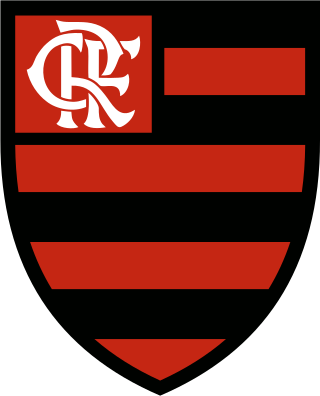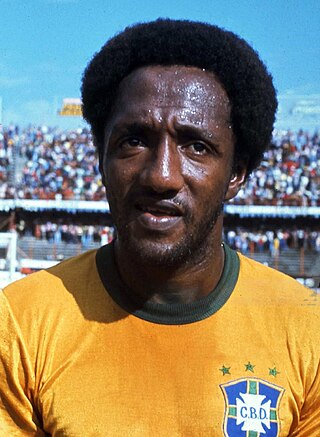
Botafogo de Futebol e Regatas is a Brazilian sports club based in the neighborhood of Botafogo, in the city of Rio de Janeiro. Although they compete in a number of different sports, Botafogo is mostly known for its association football team. It plays in the Campeonato Brasileiro Série A, the top tier of the Brazilian football league system, and in the state of Rio de Janeiro's premier state league. In 2000, Botafogo finished 12th in a vote by subscribers of FIFA Magazine for the FIFA Club of the Century. They have won the Brazilian championship two times, in 1968 and 1995.

Clube de Regatas do Flamengo, more commonly referred to as simply Flamengo, is a Brazilian multi sports club based in Rio de Janeiro, in the neighborhood of Gávea, best known for their professional football team. They are one of two clubs to have never been relegated from the top division, along with São Paulo. Flamengo is the most popular team in Brazil with more than 46.9 million fans, equivalent to 21.9% of the population that supports a team in Brazil.

Fluminense Football Club is a Brazilian sports club based in neighbourhood of Laranjeiras, in Rio de Janeiro, being the oldest football club in the state since its foundation in 1902. Competes in the Campeonato Brasileiro Série A, the first tier of Brazilian football, and the Campeonato Carioca, the state league of Rio de Janeiro. The word "fluminense" is the gentilic given to people born in the state of Rio de Janeiro, in Brazil.

Nílton dos Santos was a Brazilian footballer who primarily played as a wingback. At international level, he was a member of the Brazil squads that won the 1958 and 1962 World Cups.

The Campeonato Carioca, officially known as Campeonato Estadual do Rio de Janeiro, also commonly known as the Cariocão, is the state football league of Rio de Janeiro, Brazil. It is under the authority of the FERJ or FFERJ. It is an annual tournament, started in 1906.

Paulo Cézar Lima, known as Caju, is a Brazilian former professional footballer who played as an attacking midfielder. During his career, he played for clubs in Brazil, including Botafogo, and for Marseille in France. At international level, he earned 57 caps by the Brazil national team in the 1960s and 1970s, scoring 10 goals.

Sylvio Pirillo Cesarino was a Brazilian football striker.
Alfredo Moreira Júnior, usually known as Zezé Moreira, was a Brazilian football player and manager who coached Brazil at the 1954 FIFA World Cup. He has the most coaching appearances in Fluminense's history, with 467 managed matches for the Tricolor. His brothers also had a singular taste for football: Aymoré Moreira, winner of the 1962 FIFA World Cup and Ayrton Moreira, both of them successful coaches in the Brazilian football. In 1976, as Cruzeiro's manager, he won the Copa Libertadores.

Roberto Lopes de Miranda, sometimes known as just Roberto or Roberto Miranda is a former association footballer who played as a midfielder or striker. His nickname was "Vendaval".
Waldir Cardoso Lebrêgo, best known as Quarentinha was a Brazilian football (soccer) player who played as a forward and was notable for his fearsome left foot.
Wilson Roberto Gottardo, commonly known as just Wilson Gottardo, is a Brazilian former association footballer who played as a defender and the current coach of the Villa Nova-MG. He played in several Brazilian Série A clubs.
Marcos Vinicius Viana Ribeiro, known as Araruama, is a Brazilian footballer who plays as a central midfielder.

Waldyr Pereira, also known as Didi, was a Brazilian footballer who played as a midfielder or as a forward. He played in three FIFA World Cups, winning the latter two.

Chayene Medeiros Oliveira Santos, commonly known as Chay, is a Brazilian footballer who plays as an attacking midfielder for Guarani, on loan from Botafogo.

Aílton dos Santos Ferraz, sometimes known as just Aílton, is a retired association footballer who played as an attacking midfielder for several Série A clubs.
Emerson Raymundo Santos, known as Emerson Santos or simply Emerson, is a Brazilian footballer who plays as a central defender for Ponte Preta.

Pedro Guilherme Abreu dos Santos, better known as Pedro, is a Brazilian professional footballer who plays as a striker for Campeonato Brasileiro Série A club Flamengo and the Brazil national team.
Ubirajara Gonçalves Motta, better known as Ubirajara Motta, was a Brazilian professional footballer who played as a goalkeeper.
Gilbert Leon Hime, was a Brazilian footballer who played as a forward.
Ephigênio de Freitas Bahiense, also known as Ephigênio de Freitas or by the nickname Geninho, was a Brazilian professional footballer and manager, who played as a midfielder.















